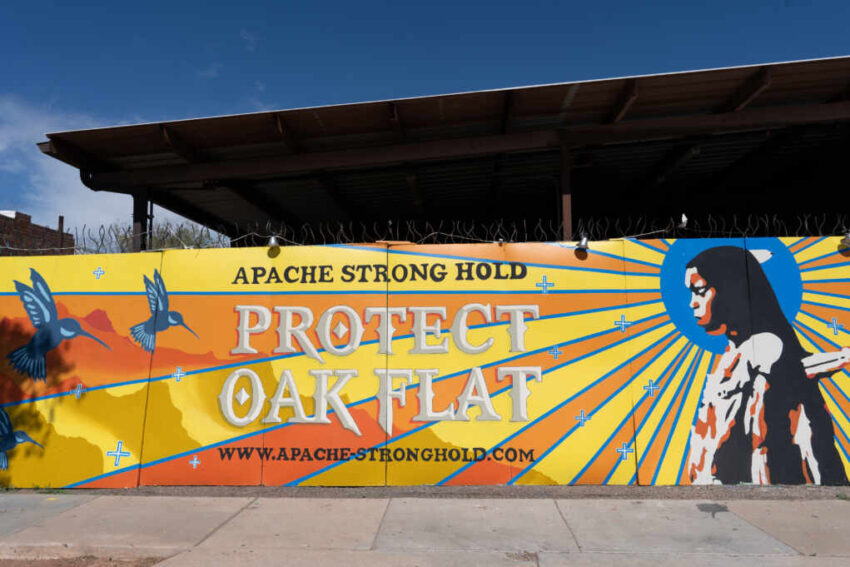A foreign-backed corporation’s plan to mine a sacred U.S. site raises constitutional and sovereignty concerns.
Story Highlights
- Oak Flat, a sacred site, is threatened by a foreign-backed mining project.
- Legal battles highlight the tension between religious freedom and resource extraction.
- President Trump’s administration faces backlash over foreign investment in U.S. lands.
- Court rulings temporarily protect the site, but its future remains uncertain.
- Debate intensifies over the influence of foreign companies on U.S. soil.
Foreign Interests Threaten Sacred Land
Resolution Copper, partially owned by foreign investors, including Chinese interests, aims to develop a copper mine on Oak Flat, a sacred site in Arizona’s Tonto National Forest. This has sparked intense opposition from the Apache Stronghold—an advocacy group fighting to protect the site. The land swap, initially included in a 2014 defense bill, has faced multiple legal challenges, temporarily halting the exchange but leaving the site’s future uncertain.
Apache Stronghold, a nonprofit advocating for the protection of Oak Flat, has brought lawsuits under the Religious Freedom Restoration Act (RFRA), contending that the mine would severely burden Apache religious practices. The case has reached the Supreme Court, with a notable dissent from Justices Gorsuch and Thomas, emphasizing the stakes for religious liberty. Despite these legal efforts, the Ninth Circuit’s recent decision temporarily blocks the land swap, but the battle is far from over.
U.S. Legal and Political Implications
The decision to allow a foreign-backed corporation to operate on sacred U.S. land has sparked a national debate. Critics argue that this sets a dangerous precedent, undermining U.S. sovereignty and religious freedom. The involvement of foreign interests, particularly from China, compounds concerns about national security and control over strategic resources. President Trump has labeled opponents of the deal as “Anti-American,” reflecting the administration’s stance on foreign investment.
Furthermore, this controversy raises questions about the federal government’s role in managing public lands. The broader implications of this case could influence future policies regarding indigenous rights, religious liberty, and foreign corporate influence in the United States. The situation at Oak Flat underscores the tensions between economic development and preserving cultural and environmental heritage.
Future Outlook and Industry Implications
In the short term, Oak Flat remains protected under the court’s temporary restraining order. However, the legal battle continues, with significant pressure on the government to reconsider the land swap deal. The outcome of this case could set a critical precedent for how the U.S. handles similar situations in the future, particularly concerning foreign ownership and development of American resources.
OAK FLAT MUST be made a National Protected Area!https://t.co/4caZy6YZPX
— Zagacki For President 2028 (@Zagacki4Potus28) August 22, 2025
The controversy has broader implications for the mining industry, potentially affecting future foreign investments in U.S. mineral resources. It also highlights the need for robust legal frameworks to protect indigenous rights and religious freedoms. As the debate continues, stakeholders across the spectrum are watching closely, recognizing the case’s potential to reshape U.S. policy on public land use and foreign investment.
Sources:
Wikipedia: American Indian Religious Freedom Act
Native American Rights Fund: Sacred Places Protection
Indian Law Resource Center: Protecting Sacred Sites
Friends Committee on National Legislation: Religious Freedom for Native Americans
The Pluralism Project: Religious Freedom for Native Americans
Click this link for the original source of this article.
Author: Editor
This content is courtesy of, and owned and copyrighted by, https://republicanpost.net and its author. This content is made available by use of the public RSS feed offered by the host site and is used for educational purposes only. If you are the author or represent the host site and would like this content removed now and in the future, please contact USSANews.com using the email address in the Contact page found in the website menu.





